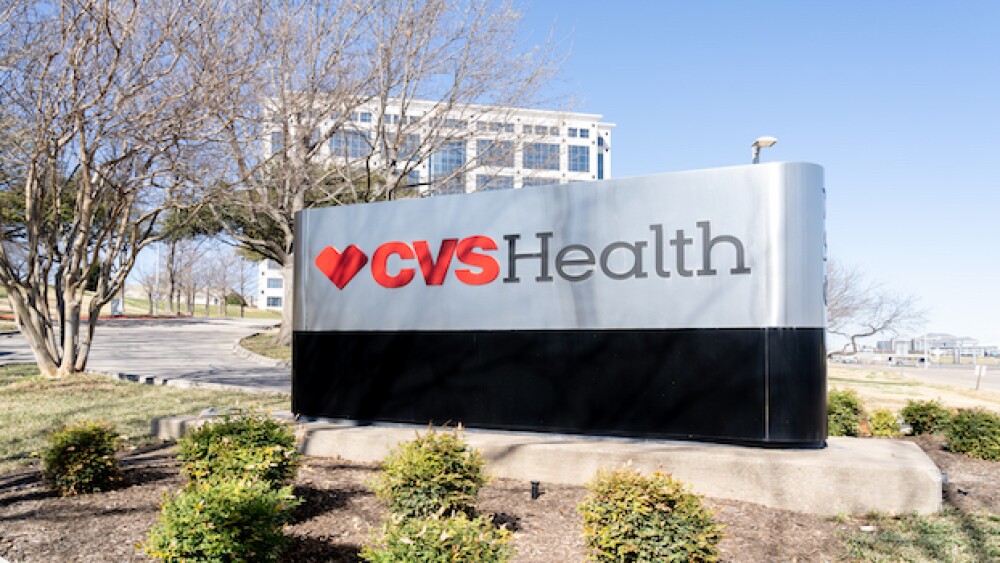The pharmacy benefit management subsidiary of CVS Health is favoring Humira’s biosimilars for its major formularies, with AbbVie’s branded product to be nixed on April 1, 2024.
Pictured: Signage at CVS Health’s corporate office in Texas/iStock, JHVEPhoto
CVS Caremark, the pharmacy benefit management subsidiary of CVS Health, on Wednesday announced that it would remove AbbVie’s arthritis therapy Humira (adalimumab) from its major national commercial template formularies, and that it would instead cover the medication’s biosimilars.
The changes will take effect on April 1, 2024, as part of CVS Caremark’s efforts to expand adoption of biosimilars and is the latest setback for AbbVie as it faces increased biosimilar competition.
“By preferring biosimilars that have a significantly lower list price than their reference product, CVS Caremark is putting our customers in the driver’s seat to best meet the healthcare needs of their members and lower drug costs,” David Joyner, president of CVS Caremark, said in a statement.
According to CVS, the U.S. biosimilars market is estimated to grow from less than $10 billion in 2022 to more than $100 billion by 2029. “A vibrant and competitive biosimilar market is essential to driving sustainable cost savings and options for consumers over the long term,” the company contends.
Despite being removed from CVS Caremark’s major national commercial template formularies, the company said that CVS customers can still access Humira through its Choice and Standard Opt Out commercial formularies, which are typically used by health plans, unions and employers for covering prescription medications.
Humira’s active ingredient adalimumab is a monoclonal antibody that targets the TNF-alpha cytokine, which is central to the inflammatory cascade and is a key driver of hyperactive inflammation. The FDA first signed off on Humira in 2002, for the treatment of rheumatoid arthritis. Since then, the therapy has picked up several other indications, including Crohn’s disease, ulcerative colitis and hidradenitis suppurativa.
Humira has since become one of AbbVie’s top-selling assets. In 2021, it made over $20.6 billion in revenue with 14% growth compared to the previous year. However, loss of exclusivity has slowly weakened Humira’s grip on the market and biosimilar competitors have already taken away from its sales. In the third quarter of 2023, AbbVie reported a 36.2% drop in Humira’s global net revenues.
The first biosimilar competitor to hit the U.S. market was Amgen’s Amjevita (adalimumab-atto), which debuted in January 2023. Over the span of a few days in July 2023, several other companies launched their Humira biosimilars, including Celltrion’s Yuflyma (adalimumab-aaty), Organon’s and Samsung Bioepis’ Hadlima (adalimumab-bwwd), Sandoz’s Hyrimoz (adalimumab-adaz) and Boehringer Ingelheim’s Cyltezo (adalimumab-adbm).
Aside from being a biosimilar, Cyltezo has also won the FDA’s interchangeability designation, which according to its label means that it has “no clinically meaningful differences” from Humira. This designation also allows doctors to prescribe Cyltezo instead of the reference product without having to change the prescription.
In October 2023, Boehringer Ingelheim announced that it would offer unbranded adalimumab-adbm at a wholesale price that was 81% lower than Humira.
To help it weather the declining sales of Humira, AbbVie is leaning on its anti-IL23 therapy Skyrizi (risankizumab)—approved for plaque psoriasis, Crohn’s disease and psoriatic arthritis—and Rinvoq (upadacitinib) its oral JAK inhibitor indicated for arthritis, ulcerative colitis, atopic dermatitis and Crohn’s disease. In the third quarter of 2023, these products brought in nearly $2.13 billion and $1.11 billion, respectively.
Tristan Manalac is an independent science writer based in Metro Manila, Philippines. He can be reached at tristan@tristanmanalac.com or tristan.manalac@biospace.com.






